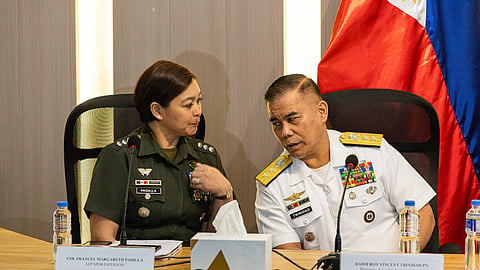
- NEWS
- the EDIT
- COMMENTARY
- BUSINESS
- LIFE
- SHOW
- ACTION
- GLOBAL GOALS
- SNAPS
- DYARYO TIRADA
- MORE

The Philippines expressed mounting concern on Tuesday as Chinese coast guard vessels continued to encroach on its maritime boundaries.
This year, Chinese patrol ships have ventured as close as 111 kilometers (69 miles) from Luzon, a significant breach of Philippine territory. The distance of 111 kilometers is roughly the distance between Manila and Batangas province, and is well within the Philippines’ exclusive economic zone (EEZ) which is 200 nautical miles.
Beijing’s territorial claims in the South China Sea had long been rejected by international courts, which ruled that China’s claims had no legal basis.
Despite this, China has increased its presence in the waters, exacerbating tensions.
The Philippines has expressed alarm particularly over the recent deployment of a massive 165-meter (540-foot) China Coast Guard vessel dubbed the “monster ship.”
The vessel was last seen just 143 kilometers (89 miles) west of Capones Island in Zambales province, a move the Philippines considers part of a broader intimidation campaign to assert control over the contested waters.
In a press briefing on Tuesday, National Security Council (NSC) spokesperson Jonathan Malaya voiced the country’s growing concern, stating, “It’s getting closer to the Philippine coastline and that is alarming.”
He said the Philippines had formally asked China to withdraw the vessel. “We’ll take it from there depending on their response,” he added.
Malaya said these movements reflect a deliberate attempt by China to discourage Filipino fishermen from fishing in the contested waters of the South China Sea.
“We do not and will not dignify these scare tactics by backing down. We do not waver or cower in the face of intimidation,” Malaya said, stressing that the Philippines will continue to assert its right over its territorial waters.
In response to the growing Chinese presence, the Philippine Coast Guard (PCG) has deployed its own ships, the BRP Gabriela Silang and BRP Teresa Magbanua, measuring 84 and 97 meters, respectively, to monitor the Chinese vessels and attempt to drive them away from the country’s coastline.
Jay Tarriela, spokesperson for the Philippine Coast Guard on the West Philippine Sea (WPS), acknowledged that while the Chinese ships were not engaging in outright aggressive acts, their mere presence near Philippine waters was alarming.
Tarriela noted that while foreign vessels are entitled to innocent passage under international law, the behavior of the China Coast Guard’s vessel does not fit this description.
“The China Coast Guard calls the Philippine Coast Guard, saying they are carrying out a legitimate law enforcement operation in these waters, but their actions are taking place inside the exclusive economic zone of the Philippines,” he said.
Tarriela pointed out there was no legitimate reason for the Chinese vessel to be in such an “erratic position” within the Philippine EEZ and accused China of “intentionally illegally patrolling” the waters.
The Chinese government, through its Foreign Ministry spokesperson Guo Jiakun, responded by saying their patrols are conducted “in accordance with the law” and accused the Philippines of complicating the situation.
Guo warned the Philippines to cease actions that could “complicate the situation” in the South China Sea, urging both sides to maintain peace and stability in the region.
As of Tuesday morning, the Chinese “monster ship” was reported 77.12 nautical miles west of Capones Island off Zambales.
The BRP Teresa Magbanua, which experienced a minor technical issue on Monday, has since resumed monitoring the Chinese ship.
